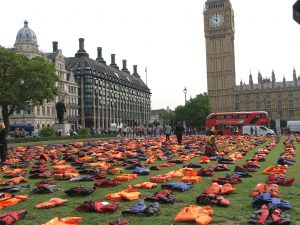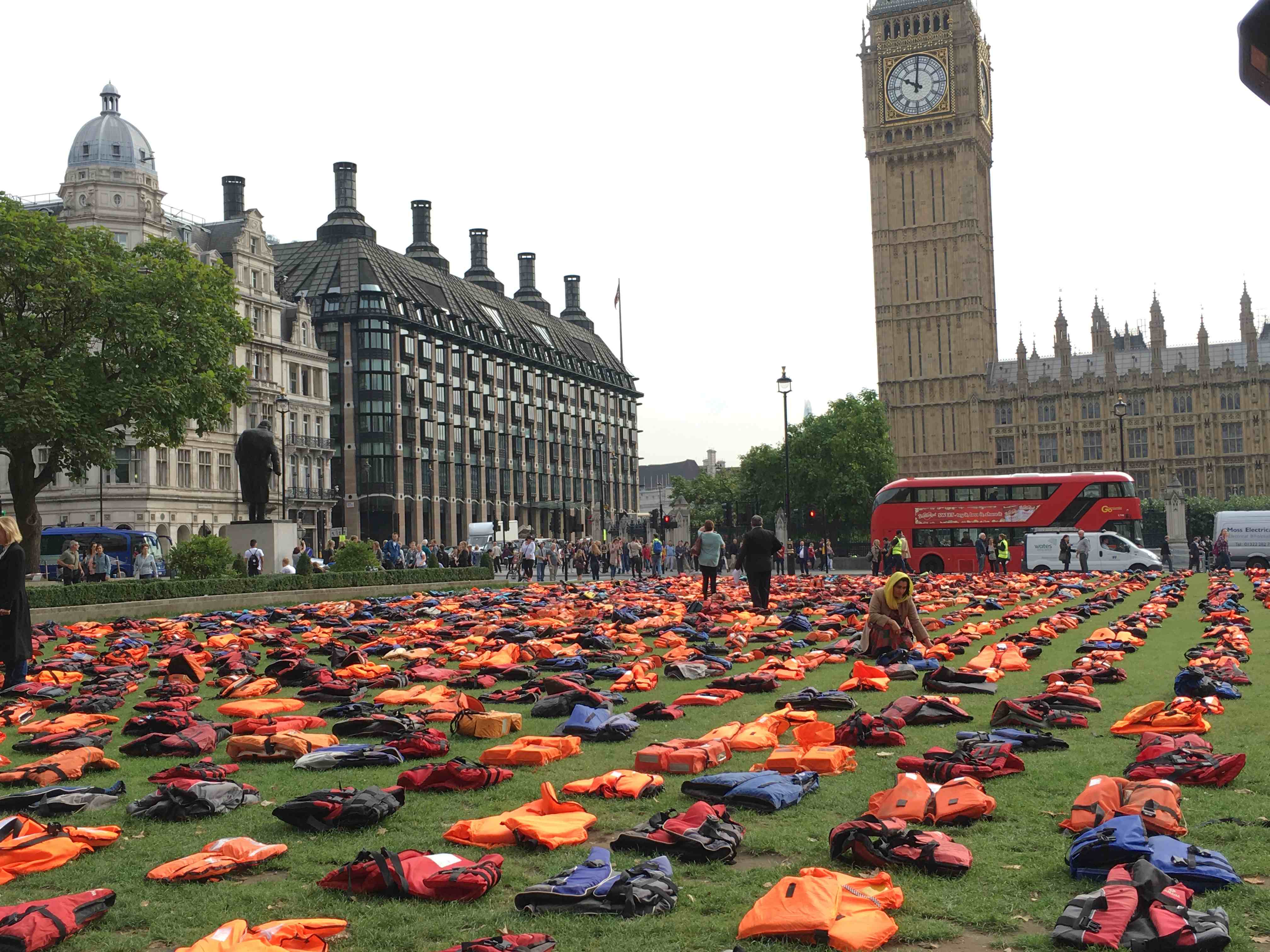by Shahd Abusalama
As world leaders were meeting in New York for the UN Migration Summit, activists transformed Parliament Square, the doorstep of British decision makers, into a graveyard of thousands of lifejackets. These lifejackets had been once worn by refugees that made it to the European beaches. No one knows if they arrived alive or as a lifeless unidentified body.
I am a refugee myself for the second time of my life in the UK; I was born as a third-generation refugee in Gaza’s Jabalia Refugee Camp, and I have recently been granted refugee status in the UK. But I am one of the lucky ones who managed to enter this country on a student visa by aeroplane and claim asylum successfully. Over the years I’ve met so many refugees who are stuck behind closed borders, putting up with bureaucratic barriers that they experience as a slow death sentence.

More than solidarity is needed
When I first saw the display, I was stricken by the children’s lifejackets which made up the majority of them. It evoked the picture of the Syrian refugee child Alan Kurdi, whose little body laid dead at the shores of Turkey. Though his story resulted in a growing movement of solidarity with refugees, this movement hasn’t yet been strong enough to enforce world leaders to take concrete actions to help these refugees and offer alternative safe passages to such deadly routes.
This graveyard of lifejackets puts the child Alan in the context of 4,176 people have died or gone missing on the Mediterranean since his death, according to UNCHR. These numbers are most likely to be rising as world leaders are discussing at the UN Migration Summit.
This disturbing scene aims to remind world’s decision makers of the ongoing suffering of tens of thousands of refugees who continue to take such deadly routes as they flee war and persecution. It is a call for immediate actions, based on humanity and solidarity, to put this suffering to an end. Most importantly, it is to emphasize that such decisions are about lives that do not have the luxury of time. These refugees continue to lead a daily struggle for survival.
Untold Stories Behind Numbers
So many stories behind these numbers have gone untold. Rahela Sidiqi, trustee of Women for Refugee Women and an Afghan refugee in the UK, narrated some of these stories that floated on the surface of her memory as she saw this scene. “I automatically remember my friends, my relatives, and so many people who died in the Mediterranean,” she said with eyes open wide as she contemplated the display of lifejackets. “A relative of a friend of mine who was 7-months pregnant died in the Mediterranean as she fled war in Afghanistan. Her husband has gone mad following her death that he couldn’t see any evidence for, except for her disappearance. He gave up on the humanity of world and decided to stay in Turkey, waiting in vain to find the dead body of his wife.”
In her work with Women for Refugee Women, Ms Sidiqi has visited the Calais’ Jungle Camp to meet vulnerable women stuck at the borders after surviving terrifying journeys. “A lady I met in the Jungle was in the middle of the ocean with her four children when the engine of the boat suddenly went off,” she recalled. “Her only wish to God was not to die in the ocean because she didn’t want her dead body to go missing or unidentified, and to be reduced to a number among the thousands of victims. She survived that terrible crossing, but she is still stuck behind closed borders, in limbo under unlivable conditions, waiting for a safe passage for her and her children.”
We, refugees, are increasingly facing different forms of anti-refugee attitudes from the public and even official bodies in our host countries, including detention, deportation, interrogation. Such ill-treatment is encouraged by the the distorted narrative of xenophobia and fear against refugees. This narrative that frames us as ‘threat’, ‘burden’ or a ‘problem’, not as an added value to the society. Such a narrative should be discussed at the UN Migration Summit and challenged.
When we think about the alarming numbers of refugees who continue to be forced to undertake such deadly journeys, we must think about their suffering. But also about the utter failure of others to understand, to empathize and to take action.
Shahd Abusalama is a Palestinian journalist who was born and raised in Gaza’s Jabalia Refugee Camp. She is a graduate of Media and the Middle East MA program at SOAS, University of London. Shahd is the author of the author of Palestine from My Eyes blog and book, could be followed @ShahdAbusalama.
